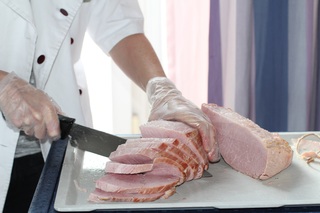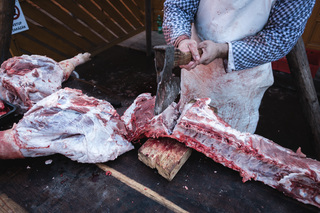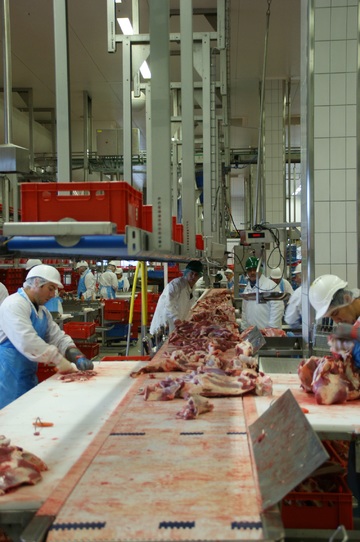
The next time a schnitzel drops onto your plate, you might want to take a moment to wonder not just about the welfare of the animal it came from, but also whether the person who processed it was treated fairly. According to research carried out recently by the British newspaper The Guardian, huge numbers of workers in Europe’s meat-processing industry are working for very low wages, and are subject to the most parlous working conditions imaginable. The vast majority of the workers employed in the meat production sector in Austria come from countries in the former Soviet Union, as well as Africa and Asia.
ONLY CHEAP IS PROFITABLE

As the climate crisis really begins to take hold, demand for meat-free nutrition is growing louder all the time. While the meat industry in Europe is responding to this social change, by creating one million jobs, but what are conditions like for the people working at the slaughterhouses and meat processing plants? Selling meat is no longer anything like as profitable as it once was, so firms are being forced to increase their profit margins by reducing the wages of their employees. The firms can also save time and money by treating the animals poorly, of course. This all enables companies to continue selling their meat more cheaply. Consumers are happy if they don’t have to spend much on their meat, of course, and the big meat firms can make a fortune – even though, as so often, this is based on the unhappiness of others.
EXPLOITATION OF WORKERS FROM ABROAD

Slaughtering and cutting up animals is physically demanding, monotonous work. It’s a job few people from western Europe want any part of. As a result, people from neighbouring emerging economies and developing countries who come to Europe end up in the industry. They often sign employment contracts they often hardly understand, as they don’t yet speak the language properly. Even in EU countries, people from Hungary, Poland, Romania, Latvia and Lithuania work for extremely low wages in the industry. In the Netherlands, for example, anything up to 90 percent of workers in the meat industry are migrants.
As a rule, the few locals who do work in the industry earn more, and a two-tier system based on nationality has long been in place. Foreign workers are employed on temporary contracts and through subcontractors, and earn around half of those workers with a direct contract with the meat producers. According to a current report by Germanwatch, one Bulgarian employee working in a meat factory in south Oldenburg was paid 1,200 euros for 225 hours of work. That means she was getting 4.70 euros an hour for her work, or just 53 percent of the minimum wage in Germany. These temporary employment contracts usually don’t include regulated working hours, payment for overtime, or sick pay. Another problem is that these workers’ visas are frequently tied to their employment contracts. That means the minute they quit their job, the migrants lose their right to remain in the country. Because of language barriers, foreign workers are unable to find out more about their rights, let alone demand those rights be met.
In recent decades, a “hierarchy of exploitation” has been created within the meat industry. The very poorest find themselves at the end of the line; Romanian slaughterhouses have imported workers from Nepal, for example. People come from around the world to work in the European meat industry, often from Ukraine, Georgia, Vietnam, The Philippines, India, China and African countries.
NOBODY WANTS TO INTERVENE

Although the authorities are aware of these abuses, nobody feels quite concerned enough to take responsibility for it. Industry association The European Livestock and Meat Trading Union (UEVBV) said the companies themselves were responsible for working conditions, and it was not their responsibility. Each individual case of exploitation should be carefully looked into, however, said Karten Maier, General Secretary of the UECBV, and abuse would “not be tolerated”. The EU Commissioner for Social Rights and Employment, Nicolas Schmit, referred to the EU rights in place, and said it was the job of national authorities to ensure these were complied with.
The biggest meat companies in Europe include Tönnies and Westfleisch, both from Germany. Tönnies hit the headlines at the beginning of the pandemic due to a corona cluster. During the breakout, the spotlight fell on the terrible working conditions of the firm in general, and the meat industry found itself confronted with accusations of exploitation. It denied everything, however, and nothing has changed since.
WHAT CAN WE DO?
If the dire conditions in the meat industry are ever to be tackled, an authority is going to have to finally take responsibility for the situation, and stand up for the rights of these workers. Consumers also have a role to play in improving the situation, however. They need to start saying no to that ultra-cheap schnitzel, and choosing meat with a trustworthy seal of quality instead. Even then, however, people still need to be careful. Many seals of quality may guarantee the meat can be bought without a guilty conscience from an ecological point of view, but they offer no information about the working conditions of the people used to produce the meat. Consumers can find out more by going to konsum.greenpeace.at and make an informed decision the next time they’re at the supermarket.
